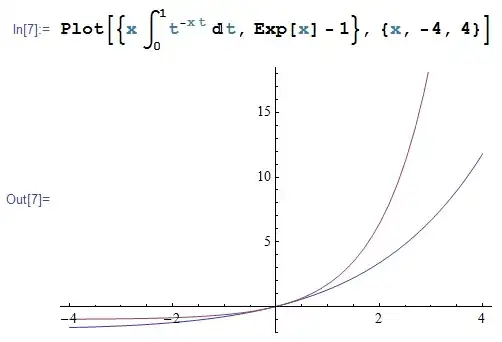When trying to prove, in this previous question, that $\sum_{n=1}^\infty \frac{x^n}{n^n}<0$ when $x<0$, a common fallacy is incited by the resemblance between the given summation and $\sum_{n=1}^\infty \frac{x^n}{n!}$:
Because $n^n\geqslant n!$ for $n\geqslant 1$,
$$\sum_{n=1}^\infty \frac{x^n}{n^n} \leqslant \sum_{n=1}^\infty\frac{x^n}{n!}=\left(\sum_{n=0}^\infty\frac{x^n}{n!}\right)-1=e^x-1.$$
Unfortunately, this proof only works for the case where $x\geqslant 0$, because the bounding on the summand doesn't hold for $x<0$ when the power $n$ is odd.
However, this invalid proof doesn't imply that $\sum_{n=1}^\infty \frac{x^n}{n^n} \leqslant e^x-1$ doesn't hold for $x<0$. As a matter of fact, we could observe the following figure, where the lower, $\color{blue}{\text{blue}}$ line is $$\sum_{n=1}^\infty \frac{x^n}{n^n}=x\int_0^1 t^{-xt}\,\mathbb dt,$$ and the higher, $\color{purple}{\text{purple}}$ line is $e^x-1$.
Therefore, how to prove that $\displaystyle\sum_{n=1}^\infty \frac{x^n}{n^n} \leqslant e^x-1$ for all $x\in\mathbb R$? (Equality holds at and only at $x=0$.)
